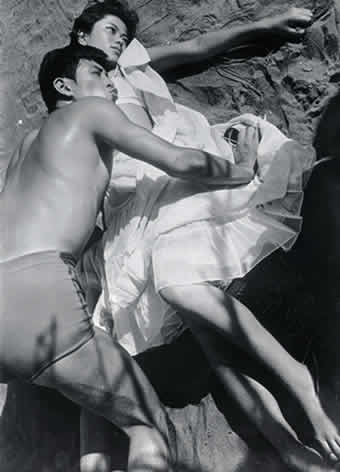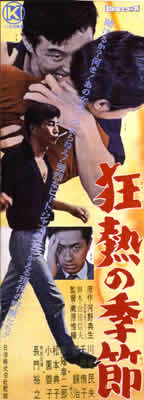 Directed by Koreyoshi Kurahara, “The Warped Ones” (aka Season of Heat and The Weird Lovemakers), is visually raw and stunning. In addition, throw in musically which is entrancing. With some films which are overrun with a soundtrack which detracts from the actual storytelling are apt to make or break a film.
Directed by Koreyoshi Kurahara, “The Warped Ones” (aka Season of Heat and The Weird Lovemakers), is visually raw and stunning. In addition, throw in musically which is entrancing. With some films which are overrun with a soundtrack which detracts from the actual storytelling are apt to make or break a film.
With a heavily laden jazz soundtrack, the music relentlessly serves to strengthen the chaotic and randomness of the characters- Masaru (Eiji Go), Akira (Tamio Kawaji), and Fumiko (Noriko Matsumoto). As a depiction of the youth culture of Japan in the 1960’s, Kurahara paints a surreal image of youth gone wild lashing out against mainstream society.
Take two guys from the wrong side of the tracks recently released from a reformatory (placed there by a reporter), the duo team up with prostitute who is just as unorthodox. The erratic and sociopathic undertones directs these characters along a pathway which immerses you deep into delinquency.
undertones directs these characters along a pathway which immerses you deep into delinquency.
The cinematography is wonderful with its moving and sometimes hand held shots. The grittiness of black and white creates the dark contrasts which further embellish our characters.
The film begins as our antihero, Akira, gallivants into the scene sporting dark sunglasses with a penchant for classic jazz by the greats of the time. You are taken in by the soundtrack as well as the splendid acting by the cast.
When I mentioned erratic earlier, this is also in regard to the plot. Though it can seem convoluted in very much of the beginning of the film, nevertheless you still want to watch it. Once the plot is up and running at full speed, it’s fully captured your attention and has a clear direction.
With revenge on Akira’s mind, he rapes his jailer’s fiancé. Once he discovers she is pregnant with his child, Akira’s revelation that all things are not without consequence or effect is shaped drastically.
All in all, I recommend the film not only for its depiction of youth culture from a country of her than ours, but for the richness in overall filmmaking. It’s a classic that should not be ignored. “The Warped Ones” has been released for the first time with new digital English subtitles by the Japan Society of New York.
* * * * 1/2
Weak: 1 Star Average: 2 Stars Good: 3 Stars Very Good: 4 Stars Excellent: 5 Stars

